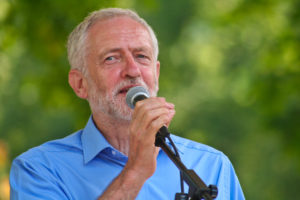Corbyn Condemns U.S. Airstrikes
The leader of the British Labor Party, Jeremy Corbyn, criticized the missile attacks carried out against a Syrian airbase by the United States in response to President Bashar al-Assad’s use of chemical weapons on civilians in the rebel-held town of Khan Sheikhoun. Corbyn condemned U.S. intervention and said that it should not have acted without the backing of the United Nations.
His claims have come into conflict with the opinions of his deputy, Tom Watson, who claimed that the U.S. strikes were a “direct and proportionate response” and that chemical attacks on civilians must face consequences, and of the British Conservative government, which asserted its support of the U.S. action. Defense Secretary Michael Fallon legitimized the United States’ actions. "They've exhausted all possible diplomatic and peaceful ways of dealing with the use by the regime of chemical weapons and they have been determined to try to prevent future attacks like this so they've taken this action today," Fallon stated.
Corbyn, on the other hand, criticized the Trump administration’s attack, saying that it acted before a thorough UN investigation could have been conducted in order to ascertain whether or not Assad really were to blame for the civilian deaths. When asked in an interview whether or not he believed Assad was behind the chemical attacks, Corbyn was quick to assert his position, stating, “We think it should have been authorized by the UN if there was to be an attack…. There should now be an immediate ceasefire and a UN-led investigation” in order to gather proof regarding who is behind the attack.
He further questioned the attack by saying that it risked “intensifying a multi-sided conflict that has already killed hundreds of thousands of people.”
When asked about conflicting decisions in his party, Corbyn was sure to assert that there was a general consensus about the need for a ceasefire and for the reconvening of the Geneva talks, along with the necessity for a political solution to Syria.
European leaders have responded to the air strike positively. In a Twitter post, President of the European Council Donald Tusk commented that the “U.S. airstrikes show needed resolve against… chemical attacks. EU will work with the U.S. to end brutality in Syria.” Jens Stoltenberg, Secretary General of NATO, upheld the necessity of the attack by actually blaming the Syrian government for it, stating that “the Syrian regime bears the full responsibility for this development.” A joint statement by German Chancellor Angela Merkel and French President Francois Hollande also claimed that Syria had brought the development onto itself, further stating that President Assad’s “repeated use of chemical weapons and his crimes against his own people demand sanctions.” Italian Prime Minister Paolo Gentiloni made sure to explicitly identify Assad’s actions as “war crimes,” saying that the U.S. air strikes were a “motivated response” to clear crimes against humanity.
In the midst of a controversial administration, the U.S. seems to have initiated an action that has, perhaps for the first time since its most recent presidential inauguration, elicited a generally positive response from the rest of the world. A defiant decision in light of the Syrian regime’s brutality, the missile attacks have opened a can of troubles in the shape of Russia, an ally of the Syrian regime. Russia has condemned the U.S. air strike and promised to respond by reinforcing Syria’s anti-airstrike facilities. A hostile environment is undoubtedly developing, and it remains to be seen whether or not the world’s superpowers can reach an agreement over controversial third party issues such as Syria.

